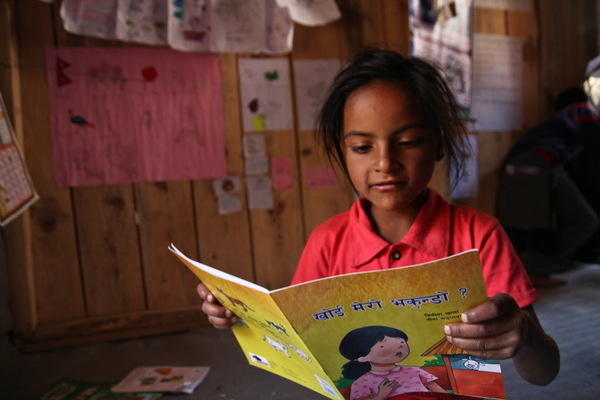Some of my favorite childhood memories involve curling up with a good book and embarking on a world of adventures unfolding on each page. But for 250 million children around the world who cannot read or write, getting lost in a story is a pleasure they may never get to experience.
For me, it's hard to imagine myself flipping through a book and only seeing pages full of symbols, unaware of their meaning or the stories they tell. But for more than a third of all primary-school age children around the world, that's a reality they face every day. And going to school is not enough to guarantee learning.
Too many children around the world are at risk of never learning to read or read well, whether they attend school or not. Children like 10-year-old Sita from Nepal. Sita lives in Budhathok village, a remote farming community, where the nearest market is 90 minutes by car (if you're lucky to have a car), families are struggling to make ends meet, and books and time for reading are a luxury they often can't afford.
Sita, 10, reads at home with books borrowed from Save the Children's mobile library in her village in rural Nepal. Save the Children's new literacy report proves that practice outside the classroom is the key to learning to read, especially among girls, children living in poverty and those with few books or readers at home. Photo by Sanjana Shrestha.
Knowing the importance of practicing reading at home, Save the Children brought a mobile library to Sita's village through our Literacy Boost program, an initiative designed to help improve children's reading ability by measuring their skill level, training teachers and engaging communities. Now Sita and her younger sister Tej, nine -- both eager participants of our program -- have become avid readers who look forward to selecting stories from a trunk full of books and taking them home.
The two girls and many children like them are living proof of the findings revealed in Save the Children's new study, Beyond School Walls: A Boost for Readers. In it, Save the Children reviewed results from the first year of our Literacy Boost program in Bangladesh, Ethiopia, Malawi, Mozambique, Nepal, Pakistan and Zimbabwe.
The research proves what Save the Children has long believed to be true: practice outside the classroom is the key to learning to read, especially among girls, children living in poverty and those with few books or readers at home.
Take a look at a snapshot of our results:
•Girls attending Literacy Boost learned 6.5 times more letters of the alphabet in Pakistan, and 2.5 times more letters in Nepal, than female students who were not in the program.
•In Zimbabwe and Pakistan, female students participating in Literacy Boost made nearly twice as much progress in reading words and sentences correctly than girls not enrolled in the program.
•In Ethiopia and Zimbabwe, Literacy Boost students from homes with the fewest books more than doubled their word-reading ability over the course of the year.
•In Pakistan, children living in extreme poverty who participate in Literacy Boost were 91.6 percent more likely to stay in school than their peers who are not in the program.
Help spread the love of reading in your home and around the world:
•Talk and read to a child every day to introduce new words into their vocabulary.
•Promote reading during everyday activities like shopping, cooking and running errands.
•Tell your elected officials in Washington, D.C. that you support U.S. investments and policies to help kids learn to read around the globe.
Interested in learning more? Check out the full report, watch a short video and read more about Literacy Boost.

